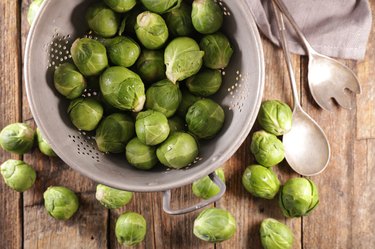
With so much emphasis placed on diet to help lower cholesterol levels, including avoiding saturated fat, the question becomes what to do about carbs. Here's how to get the most from this wide group of foods — some great for you, some not so good.
Read more: What You Need to Know About Cholesterol
Video of the Day
Video of the Day
Simple and Complex Carbohydrates
Carbohydrates are broken down by the body and turned into sugar, which is absorbed by cells and used as energy. Any additional carbs can be stored for later use. But all carbohydrates are not created equal, and different types may have different effects on your cholesterol levels.
Carbohydrates fall into one of two categories, simple (or refined) and complex. Simple carbs have a chemical structure of one or two sugar molecules, explains the Harvard T.H. Chan School of Public Health. You can digest these carbohydrates easily and quickly, which can create a faster rise in blood sugar. '
According to the U.S. National Library of Medicine, types of simple carbohydrates include:
- Table sugar
- Honey
- Fruit juice
- Dairy products
Complex carbohydrates contain three or more sugar molecules, which creates a more complicated structure that takes longer to digest. The best ones are high in fiber, vitamins and minerals and include whole grains.
Fiber is one important factor that separates good complex carbohydrates from the not-so-good, explains the Harvard School of Public Health. White rice and pasta, for instance, have had their fiber and many nutrients removed and will elevate blood sugar quickly, compared with the whole-grain versions. Whole fruit also contains fiber and will release into the bloodstream much slower than fruit juice.
Breaking Down Cholesterol
Cholesterol is a waxy substance found in your blood that can increase your risk for heart disease, explains the Mayo Clinic. There are two main types of cholesterol: low-density lipoprotein (LDL) cholesterol, and high-density lipoprotein (HDL) cholesterol.
LDL is your "bad" cholesterol as it can contribute to build-up on the walls of your arteries that can affect blood flow and lead to heart disease. HDL, on the other hand, is your "good" cholesterol because it helps remove bad cholesterol from your arteries.
An optimal HDL cholesterol level is 60 milligrams per deciliter, and it's considered a heart risk factor if it's less than 40, according to the Cleveland Clinic. The following guidelines apply to LDL levels:
- Optimal: less than 100 milligrams per deciliter
- Near optimal/above optimal: 100 to 129
- Borderline high: 130 to 159
- High: 160 to 189
- Very high: 190 or higher
Carbohydrates and Cholesterol Levels
So, what's the correlation between eating carbohydrates and cholesterol levels? A meta-analysis published in December 2015 in the British Journal of Nutrition assessed the effects of a low-carbohydrate diet on weight loss and cardiovascular risk factors, comparing it with a low-fat diet.
The results showed that people who followed the low-carbohydrate diet lost more weight and had greater increases in "good" cholesterol but also had larger increases in "bad" cholesterol, a cardiovascular risk factor, leading the researchers to question whether low-carb diets might have negative effects long-term.
Other research has focused more on how fiber-filled carbohydrates may affect cholesterol. One small study published in Nutrition & Metabolism in February 2012 looked at the effects of flaxseeds on LDL cholesterol levels.
The results showed that participants who drank a flaxseed fiber drink over seven days had a 15 percent drop in LDL cholesterol levels, compared with their LDL results from when they followed a low-fiber diet. When they switched to flaxseed fiber bread, they saw a 9 percent decrease in LDL levels, compared with the low-fiber diet results.
"You can receive adequate fiber intake by eating fruits, vegetables, whole grains, beans and legumes on a consistent basis, all of which are nutritious sources of carbohydrates," says Alexandria Sizer, RDN, LDN, a registered dietitian nutritionist and health coach with Noom in Bridgeport, Connecticut. "A high fiber diet is linked to reduced cholesterol, a healthy cardiovascular system and improved bowel movements."
"Variety is the spice of life," she says, so "explore which sources fit best on your plate." Oatmeal, oat bran, kidney beans and Brussels sprouts are also good carbs. They contain soluble fiber, which can reduce the amount of cholesterol that gets absorbed into your bloodstream, according to the Mayo Clinic. Aim for about 5 to 10 grams of soluble fiber a day to see the beneficial effects.
- Harvard T.H. Chan School of Public Health: “Carbohydrates and Blood Sugar”
- Mayo Clinic: “High Cholesterol”
- Mayo Clinic: “Cholesterol: Top Foods to Improve Your Numbers”
- Cleveland Clinic: “Cholesterol Numbers: What Do They Mean”
- British Journal of Nutrition: “Effects of Low-Carbohydrate Diets v. Low-Fat Diets on Body Weight and Cardiovascular Risk Factors: A Meta-Analysis of Randomized Controlled Trials”
- Nutrition & Metabolism: “Flaxseed Dietary Fibers Lower Cholesterol and Increase Fecal Fat Excretion, but Magnitude of Effect Depends on Food Type”
- Alexandria Sizer, RDN, LDN, registered dietitian nutritionist and health coach, Noom, Bridgeport, Connecticut
- U.S. National Library of Medicine: "Simple Carbohydrates"
Is this an emergency? If you are experiencing serious medical symptoms, please see the National Library of Medicine’s list of signs you need emergency medical attention or call 911.